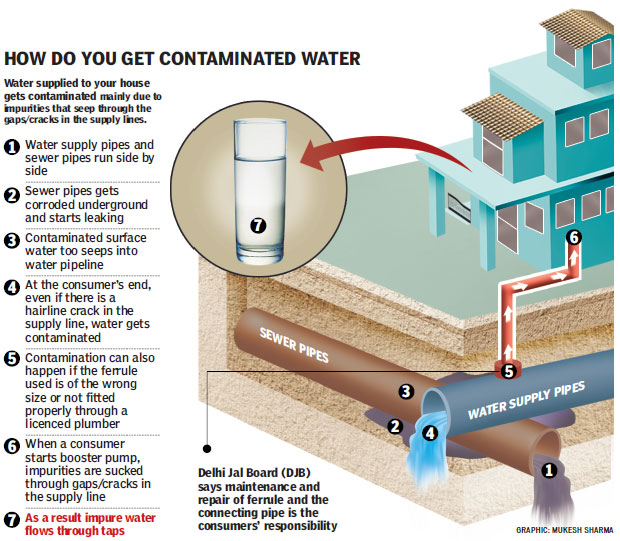Delhi Jal Board: Checking water quality in NCERT colony isn’t our job
Large-scale hospitalisation and two death due to contaminated water supply in south Delhi’s NCERT Colony have sparked obvious questions over lack of quality control checks in the colony on the part of the Delhi Jal Board (DJB). Nivedita Khandekar reports.
Large-scale hospitalisation and two death due to contaminated water supply in south Delhi’s NCERT Colony have sparked obvious questions over lack of quality control checks in the colony on the part of the Delhi Jal Board (DJB).

It has been learnt that the DJB staff did eventually go and pick samples, but only after news reports highlighted the deaths. The colony had been complaining of poor water supply for more than a week. However, the water utility has claimed it is not its responsibility to keep tabs on water quality inside the NCERT Colony.
The reason: the DJB does collect 400 water samples every day for quality checks, but no samples are taken from colonies such as NCERT colony, where DJB supplies water in bulk.
Experts say that major contamination of water supply takes place at the colony’s end. “In most areas, sewer and supply lines run side by side. When the supply lines do not carry water, they suck sewer from the parallel pipes,” pointed out Dunu Roy from NGO Hazard Centre.
Explaining how the sampling happen, DJB officials said that the agency on an average picks up 400 samples of water every day from the consumers’ end and from underground reservoirs over and above the number of samples checked at its water treatment plants.

BM Dhaul, DJB’s member (water), said: “We are responsible only for those customers who pay bills to us. Also, hospital, societies, public buildings such as Nirman Bhavan, etc., fall under bulk category. We are not responsible for quality checks at these places.”
However, Roy pointed out that the small sample size indicates that the DJB is not able to reach the colony levels at all.
But DJB officials vehemently denied any such idea. “The sample size of 400 is not small at all. This is randomised sample testing done across the city,” said Debashree Mukherjee, DJB CEO.
Incidentally, DJB’s own internal Technical Core Committee had recommended a sample size of 900 per day from dwelling units and public places and a total of 1,500 samples per day from all sources, including underground reservoirs, tankers and tubewells.
While Mukherjee did not deny the existence of the technical core committee and directed HT to contact Dhaul, he flatly denied the existence of the committee. “No such committee was formed in the last 30 years,” he said.
Claiming that contamination “always happens at the consumers’ end”, Dhaul also suggested that “bulk receivers should improve their own system of distribution and quality checks”.



